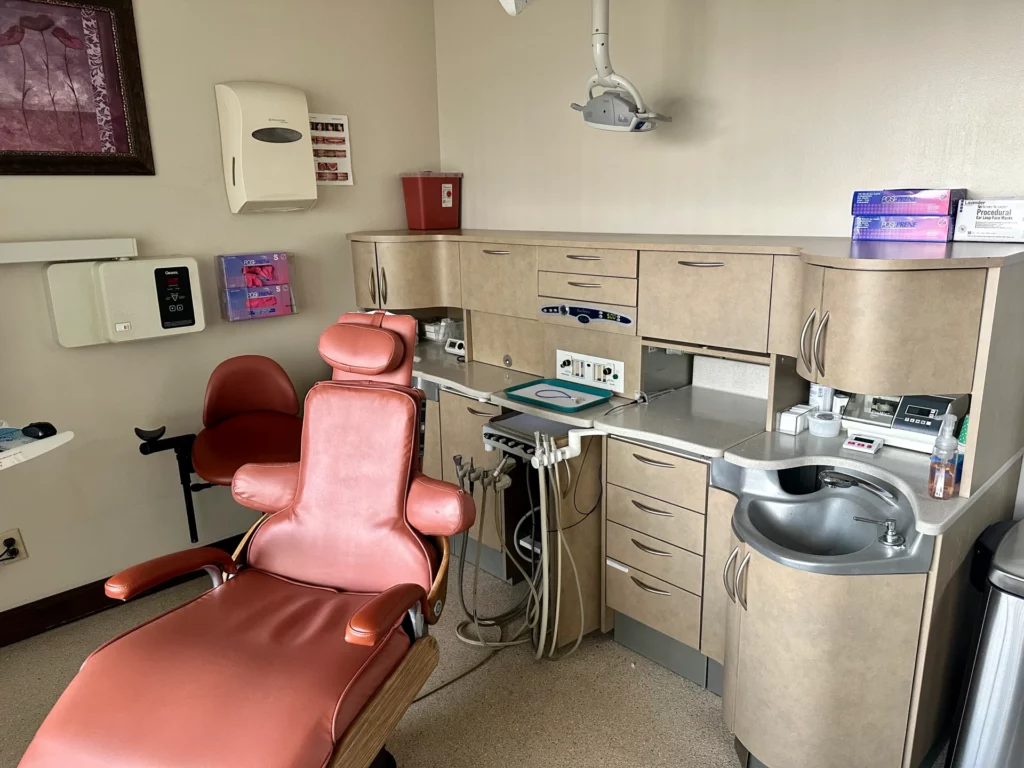- Our Practice
- ServicesAAFE-CERTIFIEDADV. TRAININGADV. TRAININGAAFE-CERTIFIEDADV. TRAININGADV. TRAINING
- For Patients
- Insurance & Financing
- Contact
Gone are the days of having an unsightly metal filling diminish your smile! Modern dentistry has made great strides in creating durable and esthetically-pleasing composite resin fillings to repair cavities and complement your smile. We can even use composite for a procedure called bonding that can cover and improve small cosmetic concerns.
If you would like to learn more about tooth-colored fillings or dental bonding, we encourage you to contact our office at (406) 628-8211 for more information or to schedule an appointment.
If you have a tooth that needs repair or replacement, it’s a good idea to consider treatment as soon as possible to avoid further damage to your smile. Contact Stokke Family Dentistry today for more information and to schedule your dental appointment.
Composite resin is a mixture of microscopic glass and plastic particles that can be customized to match your tooth. The material is pliable, easy to work with, and it bonds directly to your tooth, which makes it durable and strong.
Besides the aesthetic benefits for your smile, composite fillings also offer other benefits for patients over metal fillings, such as:
If Dr. Stokke spots decay in your tooth, it can usually be treated easily with a simple, tooth-colored filling.
If tooth decay is left untreated or undiagnosed because you haven’t visited your dentist, it will gradually get worse and could eventually reach the nerve of your tooth and result in an infection. An untreated tooth infection could lead to tooth loss, not to mention it could spread to other teeth or more critical areas of your body.
Visiting Stokke Family Dentistry every six months is the best way for you to stay on top of your dental health and treat any concerns before they become more significant problems. Being proactive about your dental health saves you time in the dental chair and money in the long run.

Dental bonding is a procedure that can eliminate some cosmetic imperfections, such as:
Dental bonding is a conservative way to restore chipped, crooked, or discolored teeth. This procedure utilizes a white filling “bonded” to your tooth in order to help improve the aesthetics. Because the white filling material comes in a variety of different shades, we will closely match it to your other teeth in order to give you a natural, beautiful smile.
Bonding is more affordable than some other cosmetic treatment options while also having the added benefit of being completed in one office visit. However, dental bonding can stain and chip more frequently than stronger porcelain alternatives (like dental veneers or crowns).
If there are some cosmetic changes you’d like to make to the appearance of your teeth, bonding is a non-invasive and affordable procedure that can significantly enhance your smile. Dr. Stokke would love to talk with you about your options for achieving your best smile.
You have come to the right place! Stokke Family Dentistry is located right here in Laurel, and we specialize in dental fillings. Give us a call or schedule your appointment online today and we will see you soon!
A tooth filling is a dental restoration that is used to repair a cavity or damage to a tooth. Fillings can also be used to improve the appearance of a tooth that has been chipped or cracked. The filling material is placed in the affected area of the tooth to restore its shape, function, and strength.
Tooth fillings can be made from a variety of materials, including:
The color of tooth fillings depends on the material used. Amalgam fillings are silver in color, while composite resin and ceramic fillings can be matched to the natural color of your teeth for a more natural appearance. At Stokke Family Dentistry, Dr. Stokke can help you choose the best type of filling material for your needs based on the location and size of the filling, your budget, and your personal preferences.
There are several types of dental fillings available, including:
The best type of filling for you will depend on several factors, including the size and location of the cavity, your budget, and your personal preferences. Dr. Stokke can help you choose the best type of filling based on your individual needs and dental health. It’s important to keep in mind that all types of fillings require good oral hygiene habits and regular dental checkups to help ensure their longevity and prevent future dental problems.
The lifespan of composite resin dental fillings can vary depending on several factors, including the size and location of the filling, your oral hygiene habits, and the amount of wear and tear the filling is subjected to. On average, composite resin fillings can last anywhere from 5 to 10 years, but with proper care and maintenance, they may last even longer.
To extend the lifespan of your composite resin fillings, it’s important to practice good oral hygiene habits such as brushing twice a day, flossing daily, and using mouthwash. You should also avoid habits that can cause excessive wear and tear on your fillings, such as grinding your teeth, biting your nails, or using your teeth to open packages.
Regular dental checkups are also important to ensure the health of your teeth and fillings. Dr. Stokke can monitor the condition of your fillings and recommend any necessary repairs or replacements before they become more extensive and costly.
During a dental filling procedure, you can expect the following steps:
Overall, a dental filling procedure is a relatively simple and straightforward process, usually taking about 30-60 minutes, depending on the size and location of the filling.
Temporary tooth filling kits are generally not recommended as a long-term solution for several reasons:
If you have a damaged or decayed tooth, it is important to call Stokke Family Dentistry as soon as possible to get proper treatment. Dr. Stokke can recommend the best filling material for your specific needs and ensure that the filling is applied correctly to restore the function and appearance of your tooth.
During a cavity filling procedure, Dr. Stokke will administer local anesthesia to numb the area around your tooth. This means that you should not feel any pain during the procedure itself.
However, you may feel some discomfort or sensitivity after the procedure as the anesthesia wears off. You may also experience some sensitivity to hot or cold temperatures, but this should subside within a few days.
It’s important to remember that getting a cavity filled is a routine dental procedure that’s typically painless and can prevent further damage or decay to your tooth. If you have any concerns or questions about the procedure, give Stokke Family Dentistry a call today!
In general, a cavity filling procedure can take anywhere from 30 minutes to an hour.
The type of filling material used can affect the duration of the procedure. For example, composite resin fillings may take longer to place than amalgam fillings because the composite material needs to be layered and cured with a special light.
It is important to remember that the length of the procedure is not an indication of the quality of the treatment. Dr. Stokke will take the time needed to ensure that the filling is properly placed and shaped to restore the function and appearance of your tooth.
Our patients are our biggest fans. Here are a few highlights from our public reviews.
Monday
8:00AM – 5:00PM
Tuesday
8:00AM – 5:00PM
Wednesday
8:00AM – 5:00PM
Thursday
8:00AM – 5:00PM
Friday
8:00AM – 5:00PM
Saturday
CLOSED
Sunday
CLOSED
We are happy to help you book an appointment or answer your questions. Please fill out our contact form and we will get back to you shortly!


